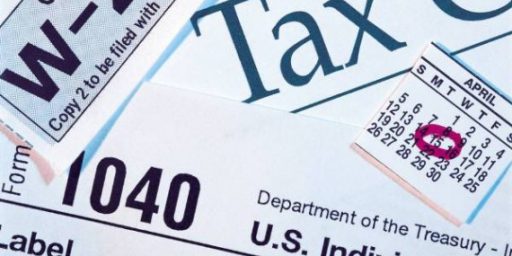Biden at Odds with Pelosi and Schumer and SALT Repeal
A Trump-era policy designed to screw over blue states may actually be a good one.

Democrats seemed united on repealing a cap on the ability to write off state and local taxes in federal filings. President Biden, though, has changed his mind on the matter, putting him on the opposite side of his party’s Speaker of the House and Senate Majority Leader.
The Axios framing (“Scoop: Biden doesn’t plan to revive SALT deduction, possibly losing key moderates“) is rather odd:
President Biden is unlikely to propose reinstating state and local tax deductions in his second tax-and-spending package despite pressure from several fellow Democrats, according to people with direct knowledge of the planning.
Why it matters: That stance could complicate his goals of passing a multitrillion-dollar infrastructure proposal.
The SALT deduction is a top priority for a number of Democrats representing blue states. Its supporters include Senate Majority Leader Chuck Schumer, House Speaker Nancy Pelosi and — during the Democratic primary — Biden himself.
The president is now signaling he won’t fight to lift the caps that former President Trump imposed as part of a 2017 tax package that lowered corporate rates.
The White House omitted lifting the SALT caps from Biden’s first infrastructure and tax package, which the president unveiled Wednesday. But some Democrats held out hope that SALT would be addressed in a second package to be announced in the coming weeks.
White House press secretary Jen Psaki told reporters on Thursday that eliminating SALT “is not a revenue raiser … it would cost more money,” but if Democrats “want to propose a way to pay for it, and they want to put that forward, we are happy to hear their ideas.”
“Final decisions are still being made on the second package, so any speculation is premature,” said a person familiar with the deliberations.
Behind the scenes: A commonly held view at the senior level of the Biden administration is that capping SALT — which Trump did to save money and punish his blue-state enemies — was actually good policy.
Senior Biden officials have soured on SALT deductions for two main reasons: It would undercut their working-class message and would cost them a fortune.
Reinstating SALT would reduce revenues by an estimated $70 billion to $80 billion a year, roughly half the annual amount that Biden has proposed to raise by hiking corporate rates.
But some Democrats insist that some tax relief under SALT could counter Republican arguments that Democrats only want to raise taxes.
“To not get rid of the SALT limits and then increase taxes could be a potential nail in the Democrats’ coffin in the mid-terms” given their narrow majority in the House, said Doug Schoen, a Democratic pollster.
That Biden and his team have changed their mind, siding with the opposition party on this issue, is interesting. But the notion that constitutes some danger to the infrastructure bill is silly. Congress, not the White House, passes budgets and tax bills. Unless Biden plans to veto a bill repealing the SALT cap—and there’s no indication that he does—it matters far more what Joe Manchin thinks. And, given that he represents West Virginia, one of the poorest states in the country, that’s likely the bigger issue here.
Bloomberg, meanwhile, under-reports the news (“Pelosi ‘Sympathetic’ to Move to Lift SALT Cap in Biden Bill“):
House Speaker Nancy Pelosi signaled support for a move to put a repeal of the $10,000 cap on state and local tax deductions in the infrastructure and social-spending program that Democrats are hoping to pass as soon as this summer.
“Hopefully we can get it into the bill. I never give up hope for something like that,” Pelosi said at a news conference on Thursday.
She called the deduction limit enacted by President Donald Trump “devastating” to taxpayers in her home state of California, and said she is sympathetic to the move by a group of lawmakers to remove the cap in any tax legislation that is part of President Joe Biden’s long-term economic plan.
She’s much more than “sympathetic.” This has been a core issue for her, for perfectly understandable reasons, since the cap went into effect. The same is true for many other Democrats who represent expensive, high-tax constituencies:
The $10,000 limitation on state and local tax, or SALT, deductions is a prime focus for several Democrats in Congress, including New Jersey Representatives Bill Pascrell, Josh Gottheimer, Mikie Sherrill, Tom Malinowski and New York Representative Tom Suozzi. The lawmakers say they won’t back any other tax-code changes to fund an infrastructure bill unless it addresses the SALT cap and have enough members to block the legislation if Republicans stay united against it.
SALT is “very important to my constituents and therefore to me,” Malinowski said in an interview Thursday. “I think the administration understands that. There are other members who feel this way.”
The representatives, along with two other New Jersey congressmen, Albio Sires and Frank Pallone, as well as Dean Phillips of Minnesota, wrote in a letter to Treasury Secretary Janet Yellen that “we could not vote for a bill that has a meaningful tax impact on our constituents unless it restores SALT deduction relief to our middle-class families.”
Other key Democrats, including Senate Majority Leader Chuck Schumer, have also voiced support for addressing the SALT cap. Yellen said at a hearing in March that “there are lots of options that have been presented, and I would work with you to try to ensure the inequities that this caused are remedied in a fair and responsible way,” without committing to a specific SALT modification proposal.
“I cheer the exuberance on the subject of the SALT tax,” said Pelosi, who called the cap “mean-spirited” and “politically targeted” to begin with. “I’m sympathetic to their position,” she added, while holding off on making a call on how to vote until the overall legislation is set.
[…]
But removing the cap could become a key area of contention as Democrats seek to raise levies on corporations and the wealthy to pay for a bevy of infrastructure, health care and social programs. In addition to costing $88.7 billion a year — revenue that some Democrats would like to direct elsewhere — doing away with the SALT cap is a politically difficult issue for some members of Congress, because more than half the benefits flow to households earning more than $1 million a year, according to the Joint Committee on Taxation.
Republicans have opposed Democrats’ attempts to repeal the cap, saying that it would amount to a large tax cut for the rich. GOP lawmakers also say it’s a subsidy for high-tax states that should instead cut their state levies if residents are overburdened with taxes.
I’m coming around to the Biden-GOP position on this issue. This despite the fact that the cap hurts me personally.
While Virginia, where I live, has turned from a reliably red state to a solid blue one since I moved here in 2002, we’re ranked 19th, between Mississippi and Montana, in effective property tax rates. Alas, we’re ranked 10th, between Connecticut and Alaska, in terms of average home prices and I’m in Fairfax County, one of the most affluent and expensive in the entire country. (Zillow puts the average home here at $635,074.)
Self-interest combined with reflexive distrust just about anything Donald Trump proposed made me oppose the cap. That it was enacted purely out of spite, punishing people in states that had voted against him, made it even easier.
But there’s no getting around that allowing the writing off of mortgage interest and state and local property taxes disproportionately benefits the well-off. Indeed, in 26 states, the median home value is less than $200,000. Those folks are barely paying $10,000 for their mortgage. But New Jersey residents, which at 2.49% have the highest effective tax rate, pay $5419 on a $217,500 home, meaning getting to $10,000 is not difficult at all.
Honestly, the only good argument for raising the limit is that it’s unfair to tax people twice on the same dollar. But we do that as a matter of course, with income, FICA, Medicare, sales, property, and other taxes taking multiple bites






Trump states for the most part are parasites on the Blue states, consuming far more in Federal revenues than they pay in, largely because the system of representation in this country makes the congressional representation of, say, a resident of Wyoming, work much more than a Californian or a New Jerseyite. And of course Wyoming’s economy would collapse in a month without the massive aid we send them every month, and the vital infrastructure in irrigation, electricity and roadways that we blue staters have paid for in their entirety.
Even Trump states like Alabama and Mississippi finance a proportionally larger part of their major infrastructure projects by sticking their hand in Blue state pockets. They seem content to live in unimproved areas unless they can get someone else to pay for it.
SALT repeal was just a way for the parasites to get more money from we Blue states. It needs to stop.
If the blue states want to have high taxes in order have decent roads, schools, and a support net, the very least we can do is not penalise them for that with double taxation.
Plus, outside of the resource-extraction states, it’s the blue states that are the economic powerhouses. You really want to put more of a burden on them and force people to move away from them?
Why is SALT always framed as “Blue state taxpayers getting an write-off, fair or not” instead of “Blue state taxpayers paying red state taxpayer’s share”? Oh, that’s right – the default mindset seems to be it is someone’s fault they live in a state that understands taxpayers need to actually pay tax in order to have things like roads. Hey GOP, one of the reasons the Infrastructure bill costs “too much” is because y’all have let things slide and now the bill’s due…. only you expect everybody to pitch in instead of just your constituents.
In the end, that’s what it comes down to. Taxes (and thus prices) are high in blue states to pay for things, taxes are low in red states because they’d rather suck at the federal teat and be hypocrites about it. If NY could pass off a ton of taxes onto the feds like say TX or AL does, then SALT wouldn’t be needed. If the question is what more “fair” – make someone pay twice for the same thing or spread the cost out to the people who didn’t pay for the same thing even once – it’s pretty clear what the ethical answer is. Trying to make this a classism thing is trying to distract from that basic fact.
Wanted to address this as well. In NY, there’s plenty of places where that line applies. In fact, I’d wager for most of NY’s homes, it’s the norm to be south of $200K rather than above. For instance, Buffalo and Rochester in WNY were at less than $150K per home per pandemic and if you went into the cities proper, that number would go waaayyyy down. I know someone who snagged a decent sized house for little more $50K near UB in the city because it was considered a “bad neighborhood” during the house crisis a few years back.
These people are not well off and they were starting to see a bit of a housing boom before COVID came. Rich folks ain’t moving to Buffalo @James; these are the working-class people that will get screwed to appease the notion that NY is full of millionaires in large houses. SALT is what keeps money in their pockets that otherwise goes someone with a McMansion out in Middle of Nowhere, OK giggling about how they don’t have to pay to keep up the social fabric; it is what’s helping offset the cost for Millennials and Gen Z to buy their parent’s houses when every penny counts. It’s eminently not fair to complain about housing costs being high in these places while trying to take away something that helps defray the costs for new buyers.
@MarkedMan: By almost all of the donor/recipient ratings done, Wyoming is a donor state. An easy-to-find (although not perfect) surrogate for federal tax donor/recipient status is the Medicaid FMAP multiplier. For FY22, the lowest multiplier possible is 1.28. Wyoming is one of the ten or so states with that value (others include California, Colorado, and Massachusetts).
Wyoming is one sort of anomaly: a relatively rich but red state. In the other direction is New Mexico: a quite poor but blue state.
The second my son graduates from high school we’re finding a place on the other side of the Occoquan. It’s amazing how when you cross that river the same house suddenly costs $100K less.
One of the R arguments against the SALT cap when the Former Guy’s tax cuts were being developed, was that it could provide a tax receipts windfall for Dems, when they gained control of government. The argument being that Dems could repeal the tax rate reductions, while keeping the SALT cap in places. Joe is right to keep the cap in place to pocket the revenue.
As much as I hate to say it because it screws me personally as a California income tax payer and a Los Angeles homeowner, the optics of restoring the full pre-Trump SALT break would be terrible. It might be the right thing to do, but Biden cannot be in the position of asking for trillions in new spending while putting money into the pockets of well-off coastals. That’s what Republicans do, Democrats believe in paying their bills.
@Michael Reynolds: Being much in the same boat, I agree with Michael. It isn’t a good look.
@Michael Reynolds: This is too far down in the weeds to matter to the those outside the blue states. The Repubs are going to paint the bill the exact same way regardless of what’s in it or out of it. Putting off economic justice to cater to some mythical “well informed but not committed voter” is a waste of time.
I don’t see why the tax cannot be adjusted so that people who make less money but live in high housing cost and SALT tax cost areas can get the break. Instead of a flat $10,000, index it as a percentage of adjusted gross income as is done with medical expense deductions. In fact you could even consider making part of it a credit for people who work say in silicon valley but are in lower paying jobs (like teachers). Then they could actually live where they work and own property there.
How is this any different from the people who complained when previous tax laws ended the deduction for business lunches and credit card interest rates?
Remove the SALT deduction caps for people living in states that pay more to the federal government than they get back.
Call it Targeted tax relief for the overtaxed.
@Doug Mataconis: “How is this any different from the people who complained when previous tax laws ended the deduction for business lunches and credit card interest rates?”
If I could hazard a guess, it’s because in that case people objected to paying taxes on money they had used to buy things. Here people are objecting to paying taxes on money they’ve already used to pay their taxes. I believe this is what is called “double taxation,” and to Republicans it’s the worst thing in the world — at least when it’s being used to describe billionaire heirs having to give up a fraction of their nine-figure inheritance. Somehow it doesn’t matter so much if it’s on someone paying for a decent house in a high-tax state.
@MarkedMan:
The attack ads write themselves. ‘Joe Biden says we need to spend 3 trillion dollars. He says it will be paid for by new taxes on corporations and the wealthy. But he’s actually cutting taxes for wealthy Democratic elites. Raise taxes on small businesses in your state to finance tax breaks for Hollywood millionaires. Tell Joe to stop the hypocrisy, stop favoring San Francisco progressives and Hollywood elites over Main Street businesses.’
: @Michael Reynolds: Michael, that’s what the ads will say no matter what is in the bill.
The hypocrisy on this issue is pretty amusing. We’ve finally found a tax increase on the rich that Republicans like and Democrats don’t like.
On the actual merits, the SALT deduction is an extremely regressive tax policy that should be eliminated or remain capped at a low amount. But then I think the same thing should happen with other regressive deductions that subsidize rich people like the mortgage interest deduction.
I think the red state vs blue state tax burden argument as a defense for SALT is particularly weak. But some states (especially CA and NY) have designed their tax systems around it, so it would have been better to phase it out over time so affected states could adjust their own systems to compensate. That’s water under the bridge. At this point, I don’t see any meritorious reason that SALT should return given that is a regressive handout to the very wealthy.
But this also brings up one of my pet policy issues – how federal taxes and many federal benefits do not account at all for the cost of living (and this same concept underlies my annoyance and skepticism of the $15 national minimum wage). I think it would be better to normalize tax burdens, wage standards, and federal benefits on cost-of-living rather than the kludgy set of gimmicks we currently use.
@Michael Reynolds: On the other hand, whatever the Democrats do, it will be called socialism, and the Republicans will lie about it. So, why spend time worrying about the attack ads?
Whether we raise marginal tax rates by a trivial amount, or we nationalize the energy sector, or we build a wall around the Dakotas and start internally deporting prominent Republicans there, the attack is going to be the same.
Focus on achieving results that leave people better off. Then, when the marginal tax rate is slightly higher, or their horrible neighbor has been arrested by the jack-booted thugs, or the economy is doing great, or the virus is under control people will say “That’s the socialism we were all worried about? It’s great!”
@Michael Cain: Here’s a recent report that shows that, despite the fracking boom, Wyoming is still the 12th most dependent state. And if you look at it as simply payments to prop up state governments, they are the 5th most dependent state. And that’s after unfathomable amounts of federal money invested in dams and irrigation canals and power lines and …. well the list goes on and on. The entire population of Wyoming would probably be less than 100K people if the other, more successful states hadn’t built them a structure out of nothing, and spent untold billions maintaining it.
edit: forgot to include link
https://wallethub.com/edu/states-most-least-dependent-on-the-federal-government/2700
@Andy:
I believe there is or was a cap on the deductability of mgt interest.
@MarkedMan: @Gustopher:
Sure, Republicans will lie; my concern is about what happens when they tell the truth. I am a coastal elite. Actually, I’d be quite a bit more ‘elite’ in Mississippi, Los Angeles not so much, but no question this would put money in my pocket. Do we want to defend that? Are we going to make the argument that a writer sitting on his ass in LA deserves more money because Arkansas is a net tax-taker?
@MarkedMan: The state government dependency is weird for Wyoming for one reason: payments in lieu of local taxes counts as federal government spending. Wyoming gets large amounts of those because it is not allowed to levy its own state taxes on the enormous amounts of coal mined on federal land. The in-lieu payments were started in 1976 when federal ownership of the western public lands in perpetuity was made official policy, and the feds realized they needed to pay some sort of state and local “taxes.” Note that the in-lieu amounts are much lower than what the state would get if they could levy the same severance tax they apply to coal produced from private land.
@Michael Reynolds:
Who would know? I mean, seriously, there will be so many lies, that one half-truth in those lies will be drowned in bullshit. We know they’re really going to be pushing “Biden appointed a trans chick to HHS, and now they are shoving the radical trans/Black/antifa agenda down our throats and hate Christians”, so what is one more thing?
The only ways to combat the lies are to either get results, or start up the FEMA re-education camps.
Yes. The folks in Arkansas need to have some “skin in the game”. Also double taxation, etc. Tax Relief For The Overtaxed.
I would be happy setting the SALT cap based on the local cost of living, honestly. Overjoyed to do so, really. But that’s not how our tax system works — it is designed to favor those living in cheaper areas (a lower portion of their income will be taxed at the higher marginal rates), and I’m ok with that. I’m not ok with double-dipping on that.
Kill the SALT cap and raise the marginal rate to compensate and be budget neutral.
Alternately, just repeal the entirely of the Trump tax cuts, since they were unfunded and a poor use of the US borrowing power. The SALT cap was part of those tax cuts…
@Sleeping Dog:
I just looked that up and you’re right – I’d totally forgotten about that. Trump’s tax changes reduced the qualifying debt amount to $750k. Combined with doubling the standard deduction means most low and middle-income people won’t itemize anyway. That increased standard deduction also affects the SALT deduction cap making it much less important for anyone who isn’t rich.
Damn, that’s a huge brain fart for me to forget about – thanks for the reminder.
@Michael Cain:
That’s an excellent point, and it’s one of many things that make these comparisons complicated. Federal public lands and their use in relation to the states they exist in are a huge consideration for the mountain west, one that isn’t often appreciated by those outside the region, where public lands are much less important.
@Andy:
How old did you say you are? 52? Oh, the places you’ll go. . . and then forget about.
On paper, the mortgage deduction is hard to defend but the reality is that a lot of people purchased homes with this deduction in mind, and when one’s taxes go up (for those in the 150k-300k yearly income range) only to see that money be pocketed by CEOs in Republican tax plan, well one can see the problem. And state taxes have to be deductible-otherwise it is paramount to double taxation and forcing states to be like Arkansas (while they grift the money from blue states).
@Andy:
If you forgot about it, it probably doesn’t effect you. 😉
@Sleeping Dog:
My wife does our taxes, so I don’t relearn the tax code every year as she does. So I’ll blame my wife 😉
@MarkedMan: @grumpy realist: @KM: It’s not true that high-tax-rate states are exclusively blue and low-tax ones are exclusively red. California, for example, has among the lowest effective rates. It’s just that states with huge metropolitan areas tend to be blue and those areas tend to have very high property values.
@Raoul: But we double-tax all the time by that standard. Virginia charges very high taxes for personal property, including automobiles. I don’t get to write that off. And a lot of states—especially red states—tend to have high sales taxes to offset low income taxes. We don’t get to write off sales taxes.
@James Joyner: you absolutely can write off personal property and sales tax on your federal tax return. You can deduct the former in addition to SALT, and the latter in lieu of SALT. In a state like Washington with no state taxes, people who itemize take the sales tax deduction. You can either deduct actual sales taxes paid, or the IRS provides a sales tax estimator tool.
@Monala:
I didn’t realize that! But it’s only technically true. According to the IRS, “You have the option of claiming either state and local income taxes or state and local sales taxes (you can’t claim both).” Further, pursuant to the 2017 act in question, “your total deduction for state and local income, sales and property taxes is limited to a combined, total deduction of $10,000.” I pay well more than $10,000 just in property tax. So, while sales taxes (the estimator puts mine at $1,334) are technically deductible, for most of us that’s a non-factor. And, I strongly suspect, people who pay little enough in property and income taxes to benefit from sales tax deductibility don’t itemize their taxes at al.
@James Joyner: This:
is simply not true. Again, taxpayers who itemize in states like Washington that don’t have state and local income taxes, depend on the sales tax deduction. True, unless they have other significant deductions, some as home mortgage interest, property taxes, and charitable giving, the sales tax deduction alone won’t help them. But when added in with their other deductions, it certainly does. In addition, people can add the actual sales tax on a big ticket item, such as a car, to the figure that the estimator provides.